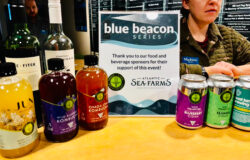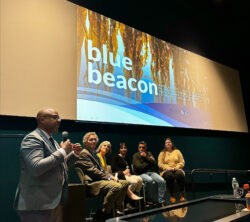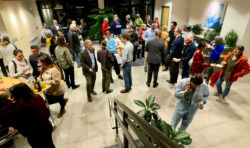Blue Beacon: Rapid Growth – Kelp as a Source of Valuable Habitat, Sustainable Food, Climate Solutions, and Economic Diversification
![]()
The National Marine Sanctuary Foundation in partnership with the Gulf of Maine Research Institute hosted a Blue Beacon Series event in Portland, Maine on November 16, 2023. The Blue Beacon Series aims to bring to light the ocean and Great Lakes’ biggest challenges through panels, lectures, and film screenings hosted around the country in order to build communities of support for marine protected areas.

Photo credit: National Marine Sanctuary Foundation
The event focused on how kelp aquaculture is a leading contributor to Maine’s growing blue economy and how it can be a model for supporting healthy communities, marine habitats, and economies. Seaweed has long been recognized as an important element of healthy ocean ecosystems and in promoting biodiversity. Recently, additional benefits of seaweed are gaining attention. Chief among them is the opportunity for: (1) economic diversification (2) a nutritional, renewable food source, and (3) its efficacy at sequestering carbon dioxide from the ambient environment. The growth of the kelp aquaculture industry in Maine presents an opportunity to support the local marine economy; eat local, sustainable seafood; create or restore habitat; and contribute to addressing climate change.
The event opened with a reception featuring generous contributions from Atlantic Sea Farms and Urban Farm Fermentory, local businesses that showcase some of the seaweed products we would be discussing. Attendees sampled Atlantic Sea Farms’ assortment of hand-crafted Sea-Chis, kimchi made with the company’s raw, clean, fresh Maine seaweed, and Urban Farm Fermentory’s Seaweed Cidah, fermented with 100% wild Maine yeast and made from all local dulse and sea lettuce to create a very unique cider with notes of the sea.

Photo credit: National Marine Sanctuary Foundation
Guests packed the Gulf of Maine Research Institute’s Cohen Center for a lively and engaging discussion from our panel of experts leading this “seaweed revolution.” Panelists included Briana Warner, President & CEO of Atlantic Sea Farms; Dr. Nichole Price, Director of Center for Seafood Solutions from Bigelow Laboratory for Ocean Sciences; Carissa Maurin, Aquaculture Program Manager from Gulf of Maine Research Institute; and Nick Branchina, Director of Fisheries and Aquaculture from Coastal Enterprises, Inc.. The panel was moderated by Peter Van Allen, Editor of MaineBiz.
From popular sushi restaurants and the post-COVID take-out boom to kimchi and nori snacks, seaweed that was once a peculiarity is now commonly seen in restaurants, grocery stores, and kids lunch boxes. And that is only direct consumption. Seaweed ingredients can be used in cosmetics, toothpaste, energy bars, and powers an emerging nutriceuticals health industry. In 2022, the Global Seaweed Extracts Market size was valued at $1.9 Billion. And it is expected to continue to grow to $2.9 Billion by 2032.
Maine is the national leader in seaweed aquaculture production. The panel highlighted the multi-faceted benefits of seaweed aquaculture production in the region, which boosted over 1.5 million pounds harvested this past year. And, in particular, they emphasized how this “superfood” and “wonder crop.” Unlike land-based crops, you don’t need fertilizer, sun or even land. In Maine we have an abundance of seaweed habitat and clean, healthy waters ideal for growing. It doesn’t require expensive technologies. Instead, it fosters diversification and new economic opportunities by creating win-win solutions with the community assets – both human capital and existing infrastructure from working waterfronts. Maine fishers and their vessels are helping to lead the way as an army of talented, hardworking partners to make this one of the most climate friendly foods on the market. And, the six weeks of kelp aquaculture harvest provides a complementary income source to lobster season.
And while Maine is the leader in the US, production out of China, Indonesia and the Philippines are the lion’s share in volume. There is plenty of room for Maine, and US production generally, to expand. However, the panel also outlined the challenges the industry currently faces centered in growing pains along different stages of the pipeline from growing to harvesting to processing to delivering to the consumer.
With the boom in demand, production needed a resilient and trained workforce with real-world experiences and vessels for water access. Bright and eager minds with two- and four-year collegiate degrees in aquaculture would enter the workforce and leave after a year or two after seeing firsthand the real work in growing and harvesting. Partners like Atlantic Sea Farms and Gulf of Maine Research Institute are developing and promoting ways to get trade programs integrated with business operations for real world experiences getting on a boat as well as basic training and skills development ranging from knot tying to electrical maintenance.

Photo credit: National Marine Sanctuary Foundation
The panel emphasized the growing needs and delays with water access, leasing, and operations permitting navigating the regulatory process. Applicants looking to lease some of these public spaces must learn about the marine environment, visit riparian landowners, and talk to harbormasters about the infrastructure available in the area. The Maine Department of Marine Resources manages these processes and also works to ensure different ocean uses are compatible to avoid conflicts and unintended effects. The regulations help keep out bad actors in the industry, but bureaucratic processes can significantly slow progress. Many homeowners do not want to live next to these operations and take different tactics to further delay and outlast efforts to expand production. Gaining a public lease might take two to five years to go through the process.
Underscoring all of this is a lack of understanding and education for aquaculturists who have to fight the unknowns in the financial sector. While many banks, credit unions, loan officers, and investors in the region might understand the fishing operations, kelp aquaculture remains more unfamiliar. While this hopefully changes with the increased data on this emerging market’s value and increased awareness from more attention, there remains a limitation.
Once production could be expanded, there is still a major pinch point in processing the harvested kelp. Transportation, cold storage, hoists, and manufacturing capacity are all needs on working waterfronts to get raw, freshly harvested kelp off the boats and into the processing to make palatable products for distribution to your Whole Foods, Wegmans, or Albertson. Working waterfronts are critical assets for this growing industry and are needed for investment in infrastructure and equipment. There is a great opportunity to recapitalize and repurpose existing facilities and support waning fishing communities, like the Portland Fishing Exchange that supported the groundfish fisheries. Revitalizing working waterfronts offers opportunities for economic stimulus and a thriving blue economy as well as celebrates the long history in the community and maintains and restores its connections to a healthy, productive ocean.
Many of these challenges and opportunities are echoed in the national discussion. A forthcoming report to Congress will outline the potential of farmed seaweed while also highlighting the challenges, many of which were covered in the discussion. The report should also provide recommendations
The panel emphasized the need to ensure that growth must be sustainable and must center communities. Maine is well poised for the next phase of this seaweed revolution given its marine environment, workforce and fishing culture, and key assets and infrastructure. Additionally, its operations are close to key consumer markets that can be supported by easy transportation and distribution needed to get fresh products onto shelves.
The Foundation thanks our event co-host, Gulf of Maine Research Institute, and our speakers for their leadership and expertise and for seeking collaborative efforts to address these timely and important issues for our ocean, people, and the planet.
This was the third and final event in 2023 of the Foundation’s Blue Beacon Series, which brings to light the pressing issues facing our ocean and Great Lakes. We hope you will join us in 2024 for more Blue Beacon Series events. Stay tuned for the 2024 schedule at marinesanctuary.org/bluebeacon.
